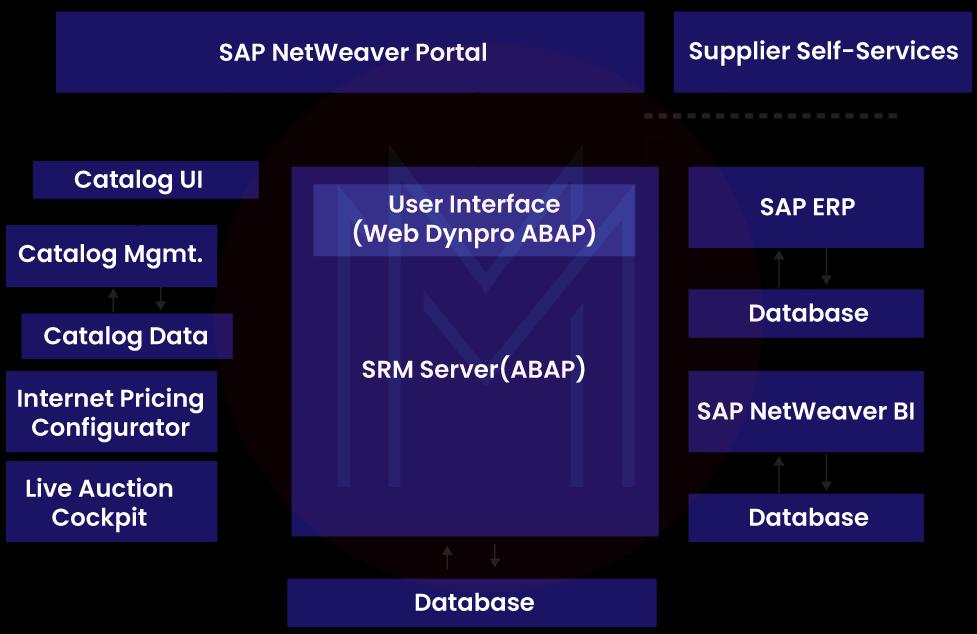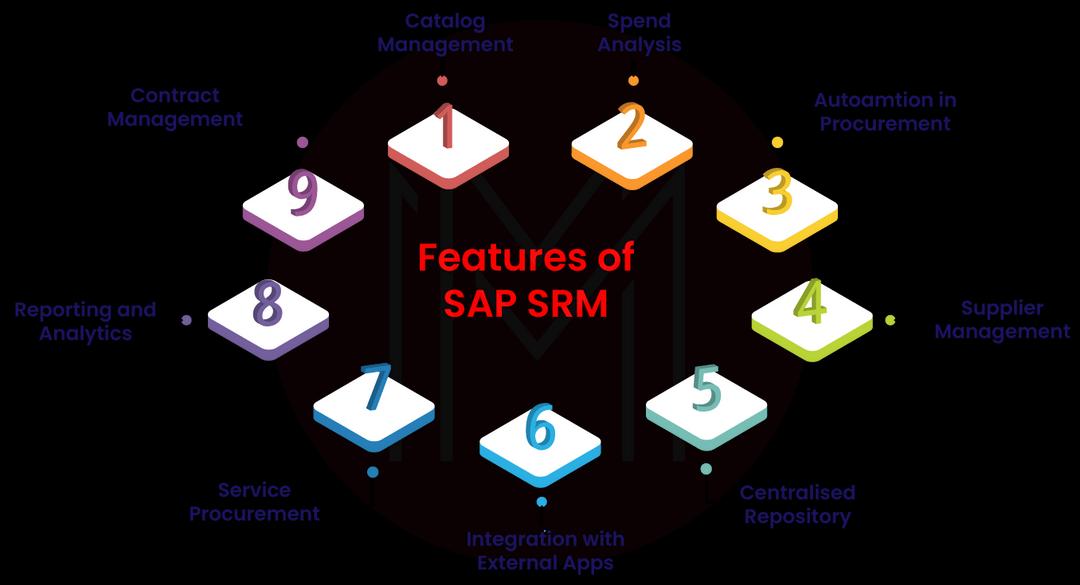Undeniably, procurement is one of the essential operations of every company. Suppliers are the key people whose role in a business is inevitable. If a company has a hassle-free relationship with its goods or services suppliers, it will phenomenally yield positive results. But at the same time, managing a consistent and vibrant relationship with suppliers is quite challenging. You need to be strategic and efficient to keep up the tempo of the positive relationship with suppliers. So, having the correct tool to streamline procurement operations and interact with your supplier will undoubtedly be a big plus.
Know that SAP SRM or SAP Supplier relationship management is an efficient tool that helps companies to optimize procurement operations and helps to improve relationships with suppliers. With this tool, you can cut down unnecessary procurement expenses and develop long-term relationships with suppliers.
So it’s no wonder if you are much interested to know what is SAP SRM and its benefits. This blog post covers what is SAP SRM, its features, benefits, integration, and a lot more along the road.
| Table of Contents: What is SAP SRM |
What is SAP SRM?
SAP SRM refers to SAP Supplier Relationship Management. It plays a pivotal role in supply chain management. This is because effective supplier relationship management concretizes the supply chain processes.SAP Supplier relationship management executes the complete procurement life cycle automatically. It streamlines various operations from procurement to payment with its automation capabilities. To understand it better, SAP SRM supports sourcing goods and services, processing purchase orders, and making payments in the end. Thus it helps to minimize expenses and maximize savings. Moreover, SAP SRM allows making effective interactions with suppliers of goods and services. It assists in building a solid relationship with the suppliers. Not only that, you can analyze the performance of suppliers and take necessary steps to improve supplier performance.

Want to know more about what is SAP SRM? Get going with the following.
The main thing about SAP Supplier relationship management is that it strengthens B2B business relationships. This SAP module ensures compliance with purchasing contracts and policies. Besides, it seamlessly integrates with other SAP modules such as SAP ERP, SAP PLM, and SAP SCM.
Now, we hope that you should have got a clear idea about what is SAP SRM.
Next, let’s learn why SAP SRM is essential, how it works, and more in the following.
| Want to become a Certified SAP SRM Professional? Visit here to learn about SAP SRM Training |
Why SAP SRM?
There are multiple reasons why SAP Supplier relationship management is essential for optimizing material procurement processes and supply chains.
Here are some of the reasons:
- Streamline the purchasing processes between suppliers and companies
- Elevate purchase quality as well as efficiency
- Improve the relationship between the suppliers and companies
- Develop a purchase strategy and smooth out purchase operations
- Reduce risks in supplier selection and procurement
- Measure supplier performance from different perspectives
How does SAP SRM Work?
Below is the step-by-step procedure that briefs how to implement SAP Supplier relationship management and how to work with it.

#1.Categorizing Suppliers
First, you must categorize suppliers based on their importance in the business. It aids in locating critical suppliers swiftly and speeds up the procurement process.
#2.Developing a supplier strategy
It is highly important to create a supplier strategy. Developing a well-designed supplier strategy helps to align business processes and suppliers on the same track.
The critical thing is that you must ensure that the supplier strategy is entirely operational and efficient. This is because you can strengthen the relationships with suppliers with an efficient supplier strategy. Besides, it simplifies the performance management of suppliers.
#3.Leveraging the supplier strategy
Effective implementation of the supplier strategy helps to hit the business targets precisely. More to the point, implementing the strategy alone is not enough. You need to ensure how effectively the strategy is being implemented. In this regard, you must devise methods to follow up on the implementation of the supplier strategy and troubleshoot it if any deviations are found.
Once the supply strategy and follow-up methods are active, procurement to payment is automatically performed by SAP SRM, aligning with the supplier strategy and other compliances.
Key features of SAP SRM
SAP SRM packs many critical features to simplify the procurement process of companies.

Let’s now unpack the features one by one.
#1.Automation in Procurement
SAP SRM automates the processes involved in purchasing goods and services. In other words, it simplifies all the processes from purchase request to delivery to payment. Importantly, automation helps to reduce repetitive tasks and human intervention in procurement. This way, you can reduce errors in procurement entirely. Also, you can improve the efficiency and accuracy of procurement to new heights.
#2. Centralized Repository
A centralized repository in SAP SRM is the single source of truth where you can store catalogs, contracts, and other crucial documents. And you can seamlessly access them whenever they are required. Moreover, the central repository plays a vital in streamlining the procurement process. Any information that you want regarding the procurement process can be accessed from the repository.
For instance, if you want the details of suppliers, legal compliance problems, pricing, performance history, contracts, or any other crucial information, you can access them in one place. It allows for streamlining the procurement process, stabilizes the supply chain, and ultimately strengthens supplier relationships.
Check Out: SAP SRM Interview Questions
#3.Contract Management
Creating, manipulating, and monitoring contracts is simplified with SAP SRM. If you want to add purchase items in contracts, you can use the catalog data. Contract management simplifies procurement and helps companies to meet compliance requirements. Besides, it helps to measure the performance of suppliers.
Contract management helps to stabilize the relationship between suppliers and companies. When the mutual commitment between the two parties is not broken, then there is an emergence of confidence. It helps to elevate the business performance to greater heights.
The important thing is that you can store contracts in the central repository securely.
#4. Supplier Management
Interaction with suppliers is simplified when you leverage SAP Supplier relationship management. You can purchase goods and services by applying robust and innovative methods. Successful purchase drives creating a long-term relationship between suppliers and companies.
#5. Spend Analysis
With SAP SRM, you can optimize procurement to payment lifecycle. So, you can reduce procurement expenses by analyzing them deeply with the help of SAP supplier relationship management. The analytics and insights you derive from the spend analysis help to boost income by reducing costs drastically.
#6.Reporting and analysis
With SAP Supplier relationship management, you can easily create reports of procurement, compliance, contract, expenses, and many other reports. Analyzing the reports helps identify the areas where costs can be reduced and gain insights to improve the business further.
#7. Service Procurement
As you use SAP SRM to purchase materials, you can use it to purchase services. The SAP SRM server for SUS plays a crucial role in service procurement. Here, SUS refers to Supplier Self-Services.
#8. Integration with external apps
SAP supplier relationship management tightly integrates with SAP ERP to perform a streamlined data transfer. Not only SAP ERP but SAP SRM makes seamless integration with non-SAP modules.
#9. Catalog management
SAP SRM allows you to create internal catalogs as well as access external catalogs. Not only that, you can customize the internal catalogs.
Check Out: SAP ERP Interview Questions
Benefits of SAP SRM
There are plenty of benefits that SAP SRM offers. That's why companies strengthen their relationship with suppliers and optimize procurement operations by adapting SAP SRM.

Let’s highlight the benefits in this part.
#1.Streamlined procurement process
Know that the SAP SRM module executes the complete procurement lifecycle perfectly. From receiving requests to payment processing, SAP SRM streamlines every activity of the procurement process, optimizing the entire lifecycle. Plus, the automation capabilities of SAP Supplier relationship management are an added advantage that helps to streamline procurement processes.
#2.Improved supplier relationships
As you know, collaboration is one of the critical factors required for business growth. SAP SRM heightens the collaboration between suppliers and companies to high levels. It ends up with improved relationships between companies and suppliers remarkably.
#3.Increased efficiency
The automation capabilities of SAP SRM simplify procuring goods as well as offering services. It is done by eliminating repetitive tasks and reducing human interventions to the least. By leveraging SAP Supplier relationship management, the interaction between suppliers and companies is enhanced significantly. Simply put, data sharing between either side is improved. Furthermore, the quality of procurement is improved, and potential risks in the procurement process are reduced with the help of SAR SRM. Overall, efficiency is enhanced because of data sharing, improved quality, automation abilities, etc.
#4.Enhanced Visibility
As suppliers and procurement information are stored in one place, SAP SRM offers wide visibility across all the purchasing operations crystal clear. You can access the relevant data from the repository at any time. Enhanced visibility makes every activity in the procurement process crystal clear. It helps to remove bottlenecks in the procurement processes and speeds up business operations. Besides, it allows a company's internal teams to collaborate efficiently.
#5.Reduced Expenses and Increased Savings
As the automation ability of SAP SRM simplifies procurement processes, operational expenses can be reduced drastically. SAP SRM contract management ensures a strategic business relationship with suppliers and eliminates exploitation altogether. Overall, operating costs are cut down, and at the same time, savings are increased.
#6.Improved Analytics and forecasting
What’s more! Integrating SAP SRM with NetWeaver BI helps to analyze expenses associated with procurement deeply. For example, you can make web-based reporting, create analytics, and much more. By analyzing the current data of the procurement process, you can accurately forecast future trends.
Steps of an SAP SRM Integrated System
From receiving requests to purchase goods to processing payments, SAP SRM integrated system effectively handles multiple things in coordination with other SAP components.
Let’s outline the steps one by one below.
- The SAP Advanced Planner and Optimizer (APO) supports planning to purchase goods with the correct quantities or services with the proper specifications.
- After that, the purchasing requirements are then passed to EBP systems. Here the EBP system refers to Enterprise Buyer Professional.
- A purchase order is generated automatically once the requirements are passed to EBP systems to procure goods.
- Now, you can examine the accuracy of details in the purchase order. If it is required, you can add or delete items in the purchase order and finalize them.
- The completed PO is then passed to the SAP R/3 environment automatically.
- Once purchasing is done, the ordered goods will be received by the employees who requested them. It is essential to create inventory simultaneously.
- Finally, invoices will be generated by suppliers. SAP SRM SUS supports generating invoices and sending them to other parties.
SAP SRM FAQs
1. What is the use of SAP SRM?
We employ SAP SRM to maintain consistent supplier relationships by providing innovative methods. SAP SRM optimizes procurement strategy, allows you to work closely with suppliers, improves supplier performance, and boosts the productivity of a business. You can also make helpful analytics and forecasting to strengthen the business.
2. Is it possible to integrate SAP SRM with other SAP modules?
Of course! Integrating SAP SRM with other SAP modules such as SAP PLM, SAP SCM, and SAP ERP is possible.
3. Is SAP SRM a good tool?
Yes. SAP Supplier relationship management is a good tool, undoubtedly. It supports to develop the long-term relationships with suppliers. It simplifies procurement processes and cuts unnecessary costs in the procurement.
4. Which one is the replacement for SAP SRM?
SAP Ariba, another SAP module, is the correct replacement for SAP SRM.
5. How is SAP SRM different from SAP Ariba?
SAP SRM is an SAP module that manages the procurement process throughout its entire life cycle. It aids in building a solid relationship with suppliers.
On the other hand, SAP Ariba provides extensive benefits such as deeper spend analysis, working closely with employees and customers, reducing risks in suppliers and markets, and so on.
6. Which SAP module is highly suitable for the IT sector?
SAP ABAP is a highly suitable SAP module for the IT sector. SAP ABAP stands for Advanced Business Application Programming. Know that It is a programming language developed by SAP.
7. What is the salary of the SAP SRM consultant?
The salary of the SAP SRM consultant comes to around 6.2 LPA.
8. Is SAP SRM still used?
Yes. SAP SRM has been in use since 2002. But, it will no longer be available after 2027.
Conclusion
In short, SAP SRM is the SAP module that streamlines the entire procurement life cycle and optimizes the purchase of goods and services remarkably. We believe this blog might have spotlighted what is SAP SRM, its prime features, benefits, and more. Remember, SAP supplier relationship management's various vital features help build consistent supplier relationships.Want to become a Certified SAP SRM Professional? Visit here to learn about SAP SRM Training
 On-Job Support Service
On-Job Support Service
Online Work Support for your on-job roles.

Our work-support plans provide precise options as per your project tasks. Whether you are a newbie or an experienced professional seeking assistance in completing project tasks, we are here with the following plans to meet your custom needs:
- Pay Per Hour
- Pay Per Week
- Monthly
| Name | Dates | |
|---|---|---|
| SAP SRM Training | Feb 24 to Mar 11 | View Details |
| SAP SRM Training | Feb 28 to Mar 15 | View Details |
| SAP SRM Training | Mar 03 to Mar 18 | View Details |
| SAP SRM Training | Mar 07 to Mar 22 | View Details |

Ravi is an author, coach, and business leader with more than 25 years of experience in the IT industry. He had a long tenure at SAP Labs as Director for Engineering Services of SAP Technology Stack and gained a broader perspective and expertise in multiple SAP solutions. He wrote and managed multiple thousands of pages of knowledge material on various SAP solutions, and actively contributed to SAP events and forums. Besides SAP, he has been a technical mentor for various start-up companies that develop AI and Data Science based solutions. He helped multiple educational institutions in building IT functional-oriented educational programs and promoting industry connect initiatives.




